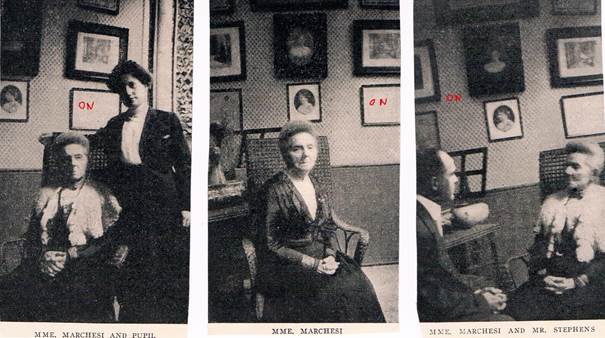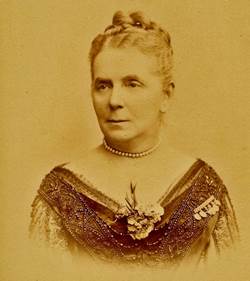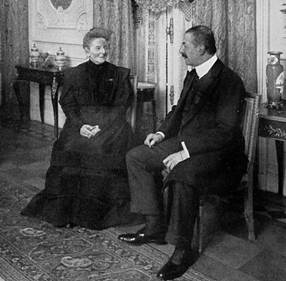
MATHILDE MARCHESI an interview by Ward Stephens (1872-1940)

Click here for another interview by William Armstrong on Marchesi's teaching principles.
Mme. Marchesi needs to introduction to the musical world. Universally recognized as the most prominent teacher of the voice, she has uninterruptedly devoted herself for over forty years to the art of singing.
The majority of American girl students of singing who went to Paris, called at No 44 Rue Jouffroy to have their voices tried , and perhaps eventually to study under this remarkable woman . It was my good fortune to dine with Mme. Marchesi one evening , and it was then that she told me about herself and her art. In her home she is delightful , and although in her eighty-sixth year at the time of the interview, she proved to be a most entertaining hostess. Despite her years , she has unusual vitality, quite surprising for one who has devoted so many years to such nerve wrecking work as teaching. She has such wonderful magnetism, no one can help loving her.
Her early days were spent at Frankfurt-am-Main where she was born, March 12, 1826. Her father Johann Friedrick Graumann, was of French origin, and a merchant of considerable means. Mathilde was the youngest of three sisters. Her mother was the guiding light of the young girl, and responsible for her education, especially along musical lines. As a very young child Mathilde showed a great love for music and, being of a cheerful disposition, was constantly singing around the house. Still, if anyone asked her to sing, she would refuse, unless she liked the person, and thought that the request was made because of an interest in her.
In school she always stood at the head of her class, and was a great favorite with her classmates and teachers. Whenever the school had special programs, little Mathilde was always entrusted with solo parts, a charge of which she was very proud. She had a French governess, and the best tutors were employed to further her education. Although she made a thorough study of English and Italian, also of harmony and the piano, her domestic training was not neglected, as her mother guided her in the art of cooking, sewing, mending, and embroidering.
These matter-of-facts duties were always very distasteful to Mathilde. She much preferred her music or dancing lessons, in which she excelled. On very rare occasions she was allowed to attend the opera; her grandmother had a box, and Mathilde would be allowed to go, but perhaps would have to stand the whole evening, for “seats were too expensive for little girls” as her father would say. But she didn’t mind so glad was she to hear great music.
When in her teens she was thrown on her own resources, her father having met with extreme financial reverses. She became a governess in the family of a Count then living in Vienna. From her father’s point of view it was not proper for the young Mathilde to become an artiste, but through the savings of an elder sister who was also a governess, she was enabled to continue her musical studies in Vienna. It was a splendid thing for the young Mathilde to be thrown in with Vienna society, as it was there that she met many of the great musicians.
She related an interesting incident about a visit made by her aunt to one of the music shops to try over a number of compositions. She frequently did this, as she didn’t have the money to buy them. On this particular day she was playing over several of Beethoven’s sonatas. So absorbed was she in her playing that she did not notice a young man in the shop who had been watching her. After little while, he approached her and thanked her for rendering his sonatas so beautifully. It was Beethoven himself, and from that day they became good friends.
While studying singing in Vienna , under Nicolai, she was accosted by Mme. Viardot, who hearing her sing, said she was not using her voice correctly. “My dear child”, she said, “I wish you would go to Paris and study under my brother Manuel Garcia”. So with this in mind, Mathilde returned to Frankfurt, and began giving lessons in order to earn money to take her to Paris. Before leaving, she sang at a concert there, at which time she met Felix Mendelsohn, who at once became greatly interested in her.
At last her fondest hope was realized. She was in Paris, and studying under Garcia. In connection ith her vocal work, she studied French, Spanish, Italian, harmony, dancing, acting and elocution. “That is the trouble with the American students of today,” Mme. Marchesi said to me; “they do not take up these various branches, all of which are conducive to good singing, both on the concert and the operatic stage.”
After Mlle. Mathilde had been studying in Paris a year or so, Garcia met with an accident which disabled his arm , preventing him from teaching, so she was given a number of his pupils. During the following year she gave a series of concerts in London, meeting with great success; it was there she met Salvatore Marchesi, whom she later married. About 1854 Mme. Marchesi was engaged by the Vienna Conservatory of Music , and she taught there for over twenty years. Then, owing to a misunderstanding with Hellmesberger, she left the Conservatory, and went to teach at Paris, where she has remained ever since.
Among her list of pupils are such noted singers as Melba, Calvé, Emma Eames, Emma Nevada, Suzanne Adams, Gerster, and a score of others. It is to Mme Melba principally , that the American public is indebted for bringing Mme. Marchesi into prominence. Through the great success of this artist, many American singers have been induced to study under this remarkable woman, thus saving many from falling into the hands of teachers who injure rather than help voices .
Mme. Marchesi told me many interesting anecdotes of her teaching career, her great musical friends and also of her concert tours . She also showed me her scrapbook, valuable for its interesting collection of letters, with autographs, preceded by a few bars of music and bits of poetry . Her music room is completely covered with photographs of the masters and such musical friends as Gounod, Rubinstein, Verdi, Liszt, and other celebrities, and many of her pupils


The home of Mme. Marchesi is very unpretentious, everything being in the simplest taste. The rooms are small and the furniture is somewhat old-fashioned , quite a contrast to the luxurious homes of most artists of today. At one time, when living in an unusually modest way, a lady wrote for an appointment to have her voice tried. She arrived at the stated hour and said “I wish to speak to Mme. Marchesi.” When Madame acknowledged her identity, the prospective pupil cried abruptly, “You! Then I have been grossly misinformed, for a person living in such humble circumstances cannot possibly be a great artist.” And she left the house without even saying good-bye.
I asked her to tell me something about her family. She had little to say, but I could see that she had taken the death of her husband very much to heart.
“Our married life was happy” she said. “We had three daughters, but only one is living, Blanche, and she is now a very fine singer.”
“Of course you consider Melba your greatest pupil?” I asked. “No, Mme. Gabrielle Krauss had the greatest talent of all my pupils and the most wonderful dramatic voice I ever heard. Unfortunately for the world she died some years ago.”
I asked her about her male pupils, suddenly realizing I did not know of any. She laughed and said she had never taught a man, and never would; and gave no reason. I asked her what she thought of the American student and I was not surprised at her reply.
“You Americans are too impatient ; you want great results in too short a time. If you are not put on operatic songs immediately, you become discouraged, and pout and then quit, or perhaps you will try another teacher. Changing teachers and methods is bad; you should stick to one method until you have mastered it. Much time should be devoted to tone production. Look at Tetrazzini. I have never heard her sing , but I understand that she is clever and performs some wonderful coloratura feats, but her voice is not equalized . How much better if she had been less impatient, and had taken more time to round out her voice.”
Mme. Marchesi is not devoid of a sense of humor. I could not help remarking on the size and shape of her ears, saying that one would know she was musical. “Why,” she asked laughingly, “because they are so like an ass’s?”
It was getting to be nearly ten thirty in the evening, still this dear old lady did not seem to tire of talking. She was just like a child in her eagerness to tell me about her profession, and begged me to ask all the questions I wished. She watched me closely, due perhaps to the fact that she is quite deaf. Her eyes are dark and very expressive, and her manner is most affable. It was with great reluctance that I left her, for she talked so entertainingly, but realizing that she had a day of teaching ahead of her, I bade her good night, thanking her for her generous hospitality.
(Since this article was written Mme. Marchesi has given up her work in Paris and gone to London to live with her daughter, Mme. Blanche Marchesi. – Editor)